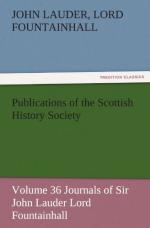I confesse the King hes reason to wrest this excessive power out of the commons their hand it being a unspeakable impairment of his soverainetie, but I fear it prosper not. I hear the Earle of Strafford, who was Deputie of Ireland, was at first but a mean gentleman yet a member of the house of commons, and on of the most stirring amongst them, which K. Charles perceiving he created him a nobleman and by that so endeared him to his intrest that we know he suffered for it.
In the middle of 1669 came his majesties letter to the secret counsell for indulging some of the outed ministers libertie to return to their oune kirks if vacant, or to preach at any other vacant churches the S. counsell should think fit to place them, and that they should not be answerable to the Bischop of the diocese where they ware, but to the counsell. Then in the Parl. 1669 was the King’s supremacie in a very hy straine established. This procedure startled all our Bischops extreimly, yet all of them ware so cunning and such tyme servers as they seimed to applaud it, only Mr. Alex’r Burnet, Arch B. of Glascow, and the Dean theirof, with some others more ingenuous then the rest, pens a remonstrance (which also they put their hands to) to be presented to the King, showing his majesty whow that course he had tane for uniting distractcd parties and healing our breaches would prove unsuccesfull, yea was to be feared would produce the just contrare effect, vid., more dissentions, etc.
Upon this occasion he[630] gets a passe, and if he refused to dimit voluntarlie then their is a warrand from his Majesty for processing him criminally: upon that and other heads, he ather judging it not safe to contend with his m’r, or else not daring bid[631] the touch, dimits in his Majesties hands and ex gratia his Maj. grants him a pension out of the fruits of that benefice of 5000 mks. per annum for all the dayes of his lifetyme.
[630] i.e. the Archbishop.
[631] i.e. to abide.
Then Lighton, Bischop of Dunblaine, was presented to it, who, after much nicety, and a journey to London, at last condeschended to take a tryall of it for a tyme under the name of Commendator Superintendent over the spirituality of that Bischoprick or some such like name, who took much paines to take up the differences betuixt the conformists and non-conformists, and to that purpose, in my Lord commissioners Audience in August 1670, ware then sundrie freindly conferences betuixt himselfe and some others adjoined to himself and some of the non-conformist ministers, upon which nothing then followed. He also in September 1670 took some moderat men, as Mr. Nairne, Mr. Cook, and others along wt him to his diocesse, by them to allure the people to frequent their oune parish churches, but he found them so exasperat wt the loud and scandalous cariage of the ministry that was planted amongs them on the removall of their former, that his great paines had not answerable successe.




